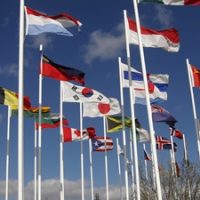In order to thrive today, students must have a grasp on what's going on in the world. The state of the globe is important to understand at least to some degree as everything from economics to politics and the environment is all intertwined between nations and continents. How can you help your kids be globally minded? Here are a few tips:
Experience new cultures
A huge part of building understanding of the world is by learning about cultures different than your own. Students and parents must actively seek these experiences. If you have the means to travel, this is the best way to fully immerse your family in another place. Head to far away countries to hear the language, eat the food and spend time with the people there. Going long distances isn't the only way to learn new culture. If you live in a big city, for example, there are likely individuals from other places in neighborhoods throughout the area. You might have access to a Chinatown or Little Italy, for instance. Spend your weekends exploring the world as a family right in your own state. Enjoy the food, visit museums and even have your kids write reports or do presentations after your adventures to show what they've learned.
Talk about the news
At a young age, kids are exposed to global news without ever seeking it out. Hearing parents and other adults talk about what's going on overseas can be confusing and even scary. Avoid negative connotations with the news and other countries by talking about what's going on. When you feel your children are old enough, see what they know about current events. Ask how they feel about new leaders, wars and natural disasters. Don't forget to touch on good and exciting news too – it's easy to get bogged down by negative events. Your family can even discuss ways to help people in need after a hurricane or during international fighting. You can always describe the news in terms your kids understand and choose to shelter them or explain whatever topics you see fit.
Learn about your ancestry
A person's heritage is a huge part of who they are and why they are that way. Teach your kids about their own personal history by creating a family tree and discussing where you come from. Maybe your children are part African, Irish and Swedish. Encourage them to learn about these areas of the world, from the religions to favorite foods, traditions and holidays. They may be surprised to learn why you celebrate Christmas, eat corned beef and hash every St. Patty's Day and have fair skin. Kids might not naturally think about why these practices are a part of who your family is, so learning about your past and ancestors is important.
You can also visit cultural museums, read books from other countries, learn a new language and become friends with people who have different beliefs than your own. All of these actions benefit your entire family and promote globally minded individuals.


No comments yet.